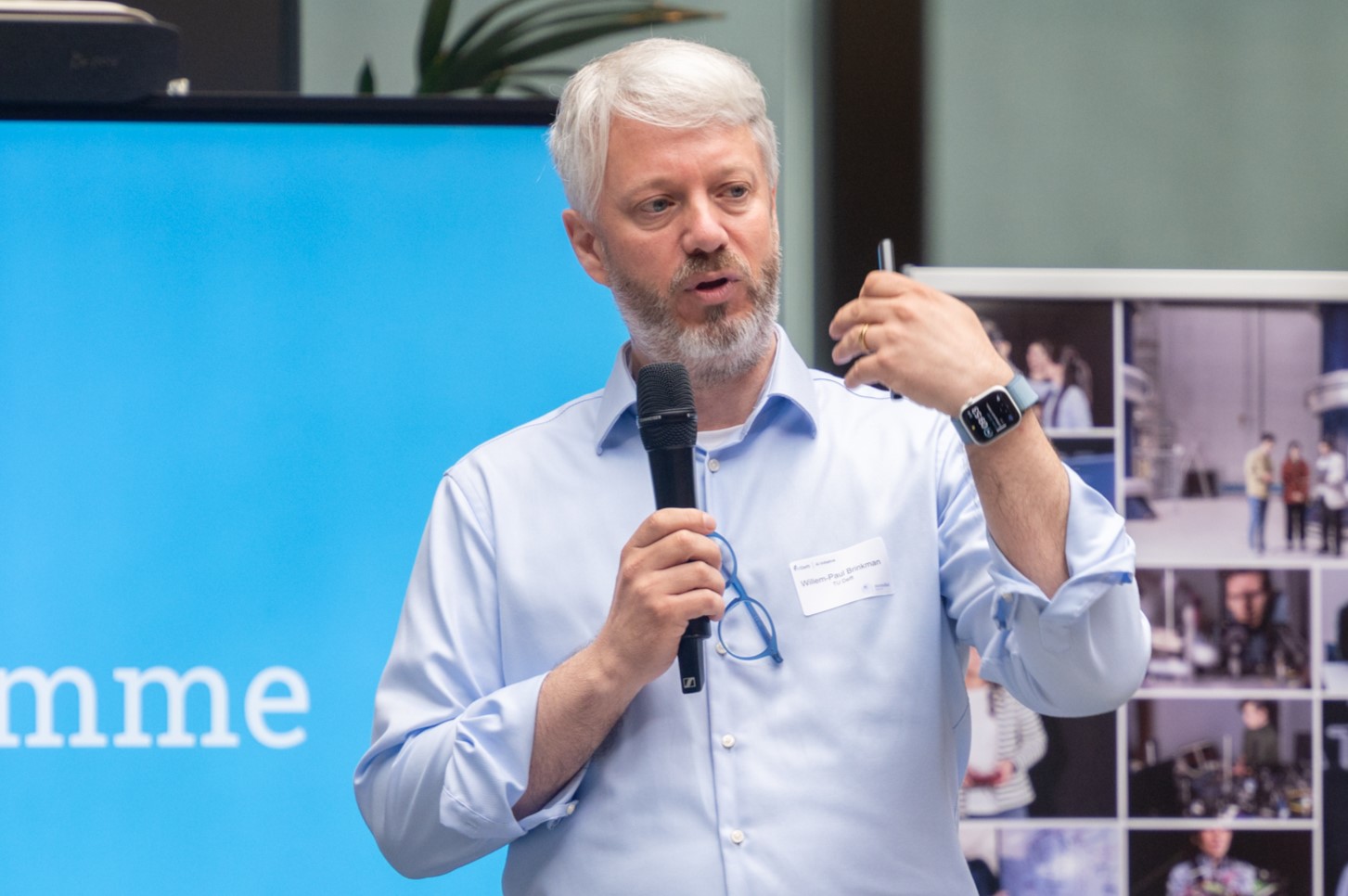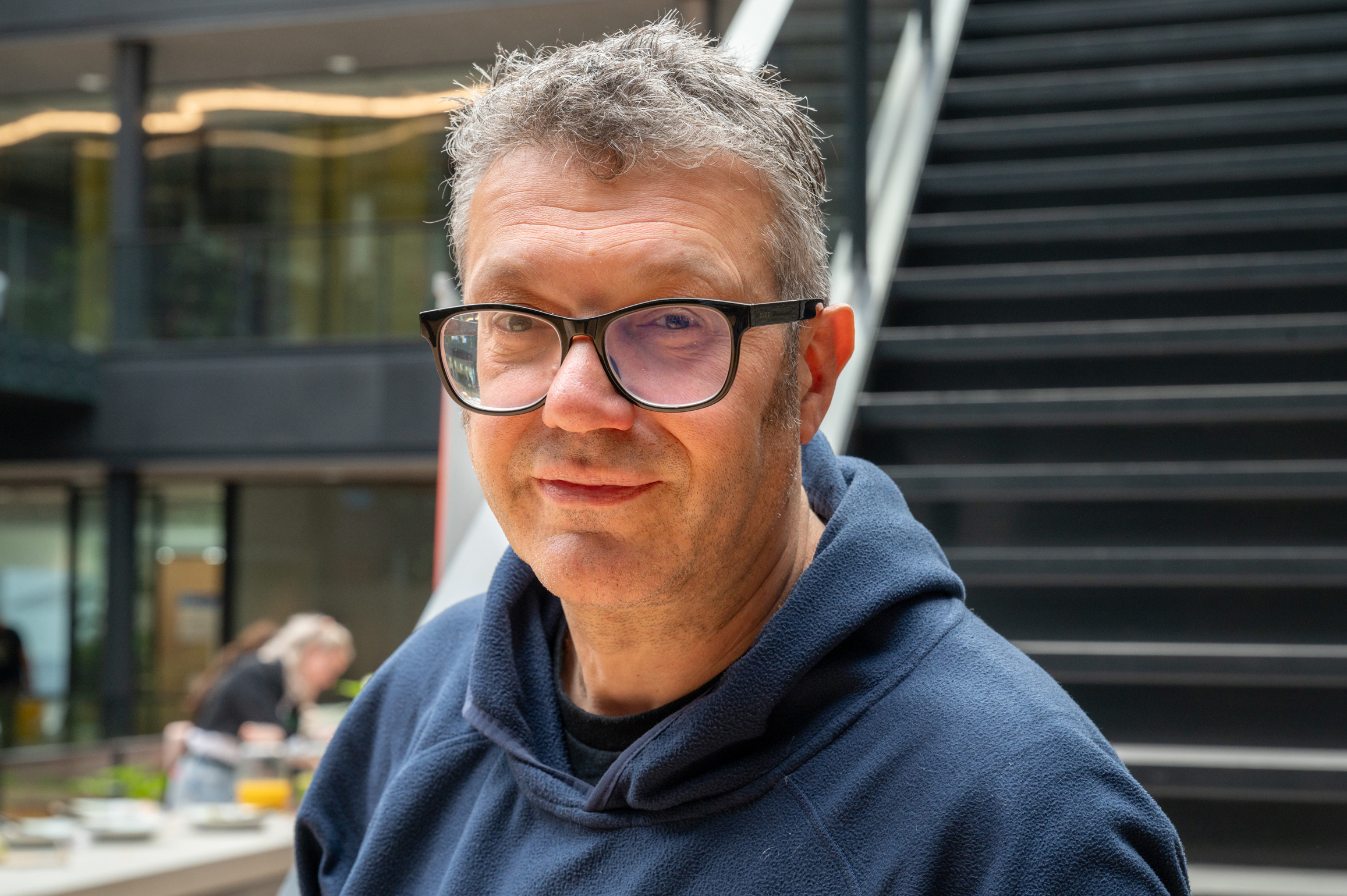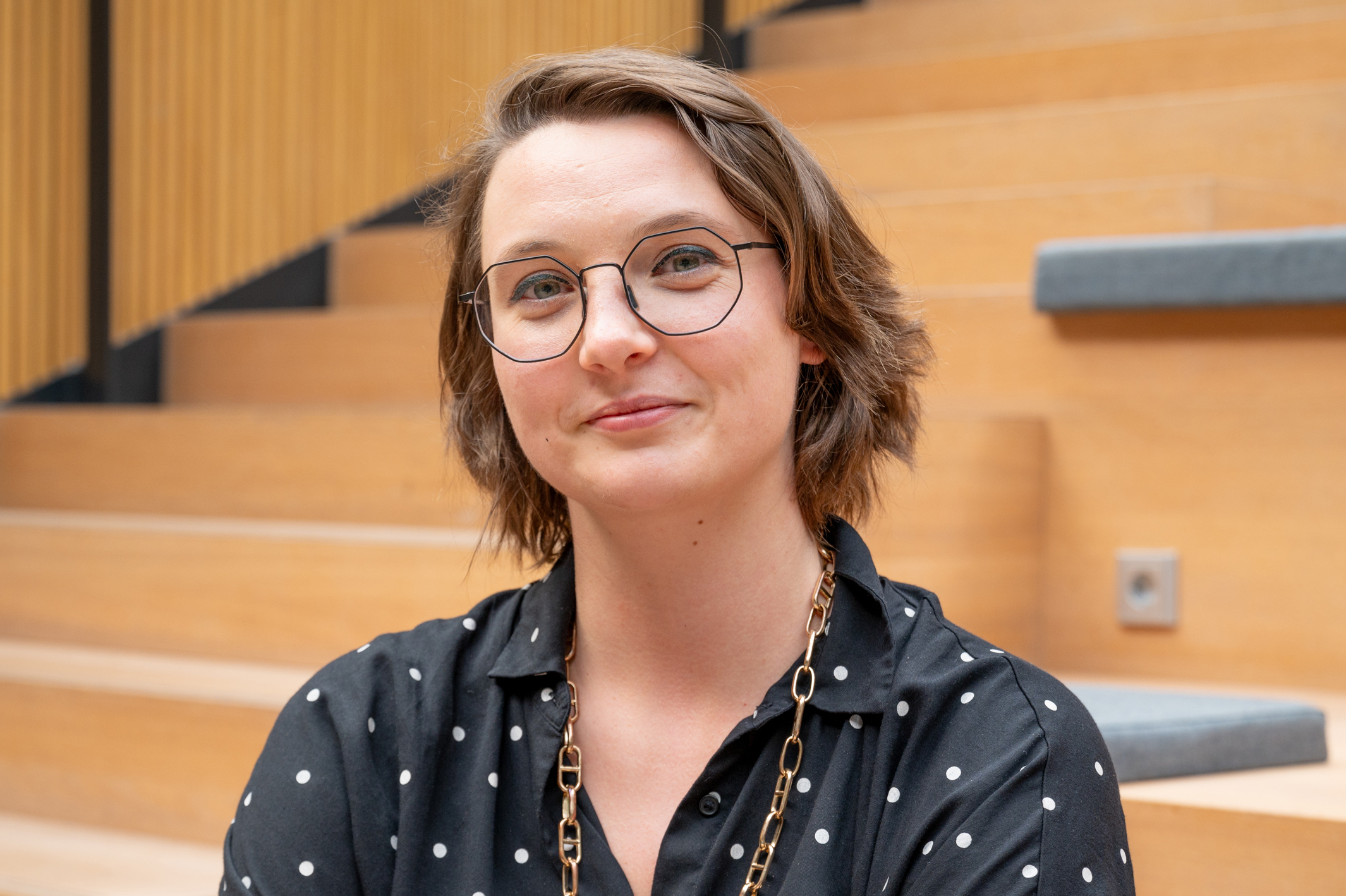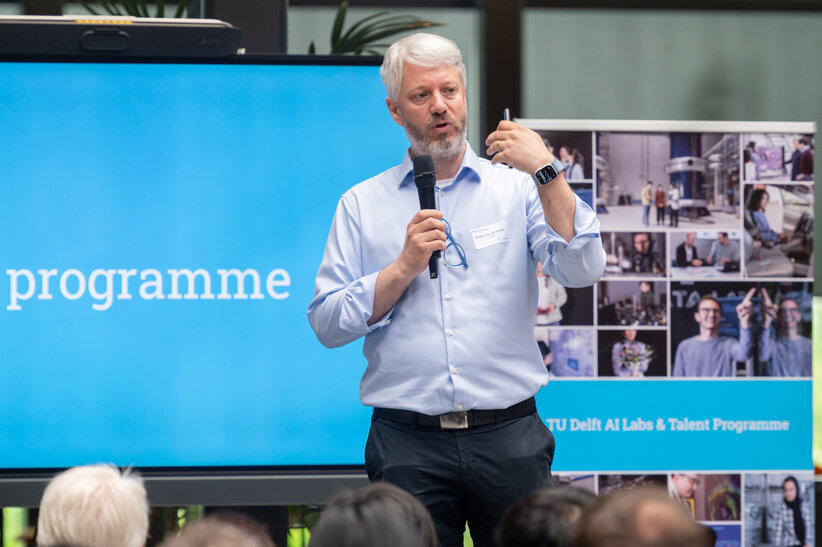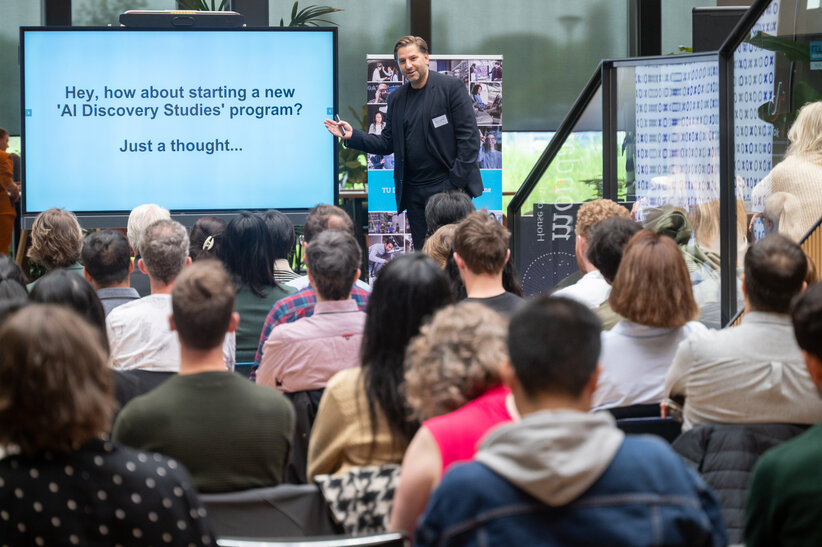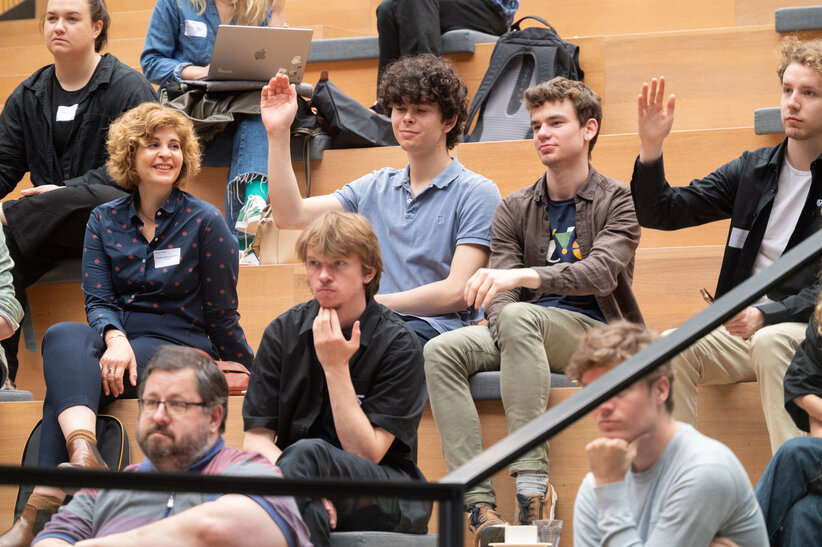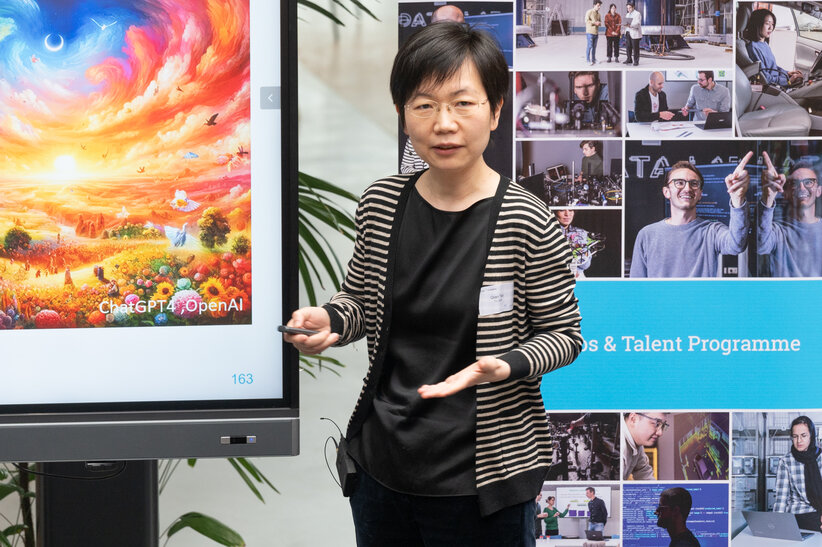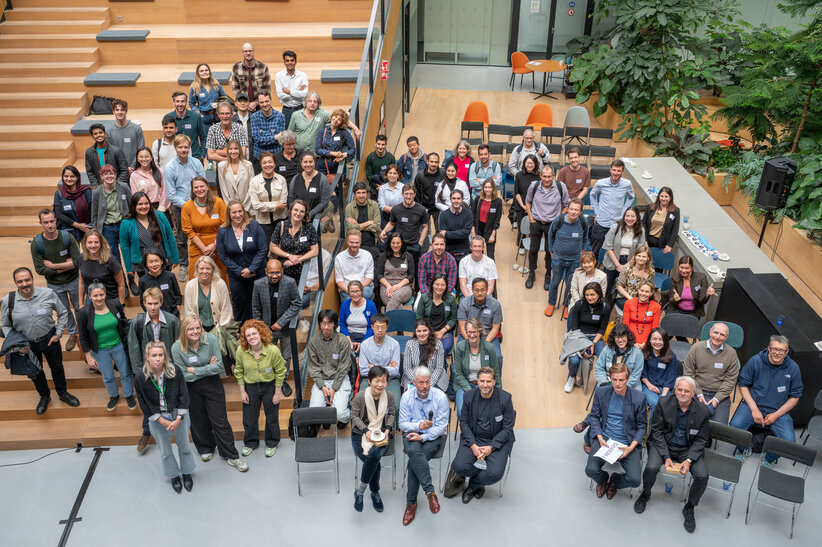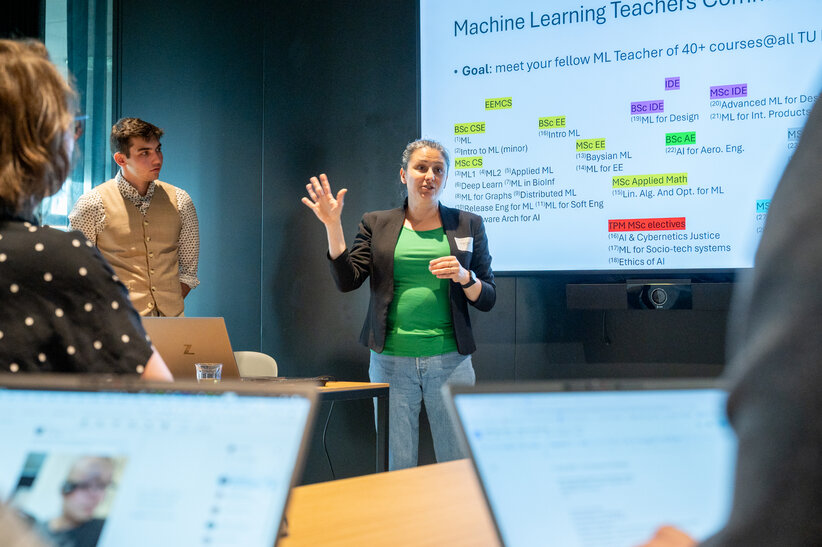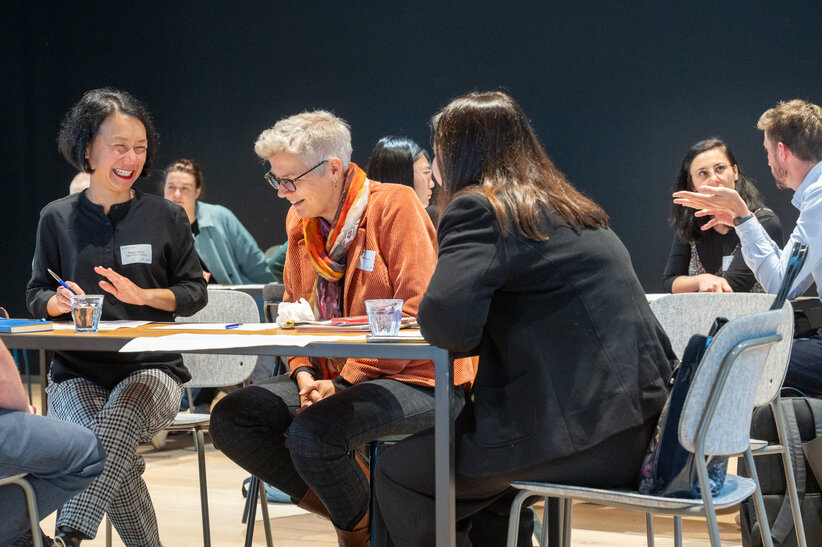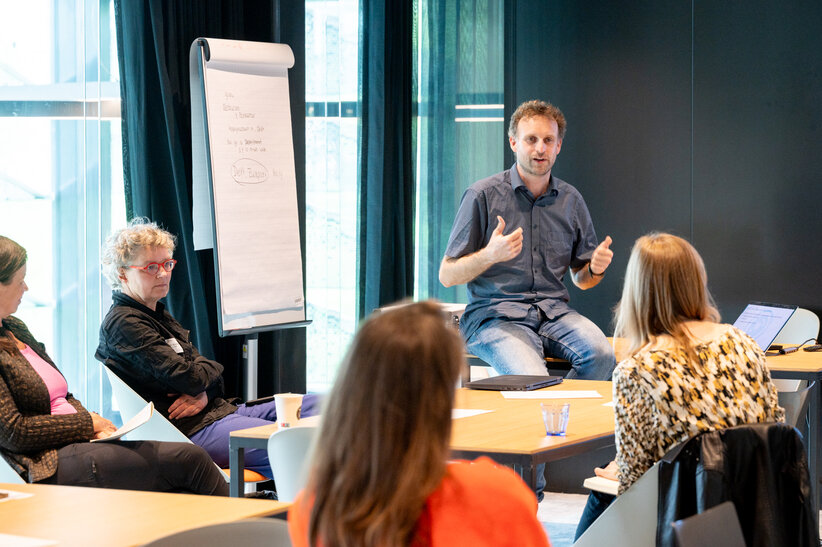Enthusiasm galore at AI Education Symposium 2024
A line-up of interesting keynotes and workshops about AI Education captivated the audience on Tuesday June 4th during the fourth annual Spring Symposium organised by TU Delft AI Initiative. From the fields of law and architecture to physics – a variety of disciplines were discussed, each showing how AI is a game changer for the future of their respective fields and the consequences this has for the education of the future. This underscores the importance of considering AI education across the whole university.
The symposium kicked-off with an invigorating introduction about AI Education by Willem-Paul Brinkman (AI Initiative Education team) and Geert-Jan Houben (Pro Vice Rector AI, Data & Digitalisation) and were followed by insightful keynotes. The morning closed with a panel discussion with the keynote speakers.
I look back with pride on the AI Education symposium of June 4th. Speakers from various disciplines showed how AI is changing their field of work. This also gets me thinking about what this all means for our education. A great example was Faculty of Applied Sciences, which created an AI course specifically for physics students. So, AI taught from their own disciplinary perspective. It was nice to see also the breadth of AI’s impact affecting various technical disciplines, from science, engineering to design. Also disciplines outside TU Delft, such as law, are reconsidering their education extensively, to prepare their students for a world full of AI
Willem-Paul (AI Initiative Academic Lead Education at TU Delft)
Open and Connected Futures: Reimagining Design Education in the Age of AI
Georg Vrachliotis and Kees Kaan (KAAN Architecten) from the faculty Architecture and Built Environment are leading experts in the industry. As keynotes, they explored the intersection of architecture and AI. Vrachliotis explored the shifting landscape of knowledge discovery in the AI era, unveiling new horizons in architectural innovation. Meanwhile, Kaan offered a pragmatic and business-oriented outlook on AI's impact within architecture, providing invaluable real-world insights into this transformative technology. They argued that we need to change mindsets, not just datasets. AI is not just a tool but a new way of knowing. Therefore, it is necessary to train the next generation of engineers and designers to approach the design and deployment of AI critically and creatively.
The reason I came to this event is that I am working on curriculum revision. So, I want to make AI more visible, or at least start including it in my education program. I think the opportunities for AI in our education program are extensive. For instance, many datasets become available, but what do you do with them? If you look more at life science technology, for example at the structures of proteins, you could imitate many interactions that might lead to beautiful ideas which can then be tested. And, students do Bachelor final projects in various places like hospitals where they also come into contact with AI-related topics. So, that perspective is one of the reasons to be here. Besides, I know very little about it anyway, so every learning moment is a valuable learning experience.
Marco van Eijk (Director of Education BSc. Life Science & Technology at Leiden University & TU Delft)
Educating Tomorrow’s Lawyers
Cees Zweistra (Erasmus University Rotterdam) brought in a new perspective on AI by discussing it from a lawyer’s point of view, discussing law for technology and technology for law. He started the discussion on the role and impact of AI-powered technologies, considering whether they might assist or replace traditional legal professionals. Examples include document generators, data analytics, and document analysis tools. Zweistra also suggested a teaching approach with a focus on technology and AI, using design-thinking, regulatory frameworks, responsible development, a critical position and approach, ethical considerations, and educational models. Future directions for specialized education include continuing narrow-AI focused education for AI-related professions, and developing inclusive programs with broad AI-education. These programs could address AI impacts and necessary skills for all, including the technical aspects as well as ethical and political implications.
What we do know, is how we can use AI in our research, the question is how can we use it to make our teaching better. That is why I think the talk about the law of the lawyer from Rotterdam (Cees Zweistra) was interesting, because I had never thought about the way how he applies it. I hope that we can harness that to apply to and improve our teaching, and not only our science. That is a take-home message for me. The other take-home message for me is that the way we look at AI is really different than how the others look at it, and it's good to see that there's a completely different angle to it.
Ulf Hanefeld (Director of Education MSc. Life Science & Technology at TU Delft)
AI for Physicists and Physicists for AI
Qian Tao (Faculty of Applied Sciences) shared her perspective as a physicist. AI requires a different approach than traditional physics. While AI and physics have complementary strengths, combining inductive and deductive reasoning can create more comprehensive and wholesome outcomes. Tao highlighted that domain-specific knowledge from physics, such as learning how to invert the diffusion process, can help generate better and more logical images and videos. Tao concludes that physicists have a sharp edge to study AI and contribute to AI. Tao cited that 4 in 5 Dutch scientists foresee that AI will have a considerable impact on society, and 2 in 3 believe AI will have a radical impact on science. These numbers emphasize the growing importance of AI. In Tao’s opinion, a future-proof physicist knows when and how to use AI. AI education makes student future-proof for industry and academia in the age of AI. As a result, Tao has started a new master elective course ‘AI for Physicists’. In this course, students learn about AI and major categories of machine learning (ML). Students can code and apply them in physics applications, and learn to analyse, benchmark, and interpret the results of ML models.
I enjoyed the whole spectrum of the symposium. I like that today mentioned AI in physics, which is amazing, because those insights I didn't know. For example, that the whole calculations can be based on certain theories that come from physics. Also, law was a surprising topic. We hear about certain things, but to speak about it is also very important. Like, do we want to replace people with AI in terms of the law? I felt that it might be a good idea, but after today, I think it is not the best idea to fully replace it. It is good as a working tool, but it should not fully replace human involvement.
Aga Blonska (Founder & Architect of Aga Blonska Studio)
Student projects in AI
Throughout the day, TU Delft students from two Dream Teams, Epoch and Emergence, as well as two student projects, Brain Builder by Pawel Rok and Laurens Ledeganck, and AI Science Communication by Joris Koopman, both from the Faculty of Aerospace Engineering, exhibited their AI-related tools and ideas. The enthusiasm and creativity of the students showcased what already can be achieved with AI, providing visitors with inspiration and excitement during the breaks.
I came to the symposium to present the tool that I made with my friend (Pawel Rok), and to exchange ideas with other people working in AI for education and see what they are working on. The tool we made is called Brain Builder. We made it for the AI course in the aerospace bachelor. We noticed that in that course, there was a bit of a gap between the theory that was taught in lectures and the codes that students were expected to write. So, we were trying to bridge that gap by creating a sort of visual interface, which lets you play around with all the parameters and then only generate the code after. And then, walks you through all the different steps in the code and how they relate to the visuals. I think, there are tremendous opportunities with AI. I am a bit involved in research on autonomous drones, and there have been some very promising results there. I know that there are also some other subfields in aerospace working in AI.
Laurens Ledeganck (Student at the Faculty of Aerospace Engineering at TU Delft)
Equipping educators with hands-on insights to foster AI education
The six workshops in the afternoon provided both thought-provoking ideas and practical insights, inviting participants to reimagine the fundamental questions behind education with an emphasis on AI.
The interactive session hosted by Gosia Migut (Faculty of Electrical Engineering, Mathematics, and Computer Science) and Bianca Giovanardi (Faculty of Aerospace Engineering) was on behalf of the Machine Learning Teachers Community. The workshop explained the origins and benefits of the community, highlighting how it enables collaboration among over 40 machine learning courses at TU Delft that previously operated in isolation. Teachers from different faculties now connect and exchange best practices and educational resources. To further stimulate this sharing, the community is also developing a platform, which was presented during the workshop.
The afternoon also provided for thought-provoking sessions. Thomas Höllt (Faculty of Electrical Engineering, Mathematics, and Computer Science) explored the revelatory power of data visualization, using insights into machine learning as a prime example. Beyond its role in communication, Höllt emphasized how data visualization is also a crucial tool for research, aiding in the discovery of new insights. ‘Impact with your AI Education’ covered Massive Open Online Courses (MOOCs) and a fruitful discussion on AI Education on these online platforms. Here, Bertien Broekhans (Life Long Learning portfolio manager AI, Data & Digitalisation) and Christoph Lofi (AI Initiative Education Team) displayed how TU Delft extends its educational impact beyond its university with 4.3 million 'global learners' participating in its online courses on platforms such as edX. TU Delft’s online courses about AI, Data & Digitalisation have attracted 76.000 users so far. During ‘AI Pedagogy through a Design Lens,’ Kars Alfrink and Hosana Morales (Faculty of Industrial Design Engineering) shared the key to the success of a recent IDE master elective course: utilizing design methodologies to allow students to learn by doing ("thinking through making") and providing space for reflection on their own processes and results.
Two teams from the TU Delft Library provided insightful workshops.The Library’s Research Data & Software (RDS) Team explored how AI tools can be integrated in the research software lifecycle, covering essential topics like introducing Large Language Models, examining the impact of code assistants on research software development, and exploring responsible use and legal implications of generative AI tools. Open Education Specialist Marcell Várkonyi (Open Science Programme) reflected on his workshop ‘(Re)defining education in the age of AI’, sharing, “This is a great way to take a step back and think about the purpose of education and address fundamental questions. The ‘why’ of education at TU Delft, for you, as a teacher, and the change AI brings to the ‘why’ of education”.
What I learned today from the participants in my workshop 'Impact with your AI Education' is that there's a lot happening around AI. Many teachers attended the workshop, and their interest and inspiration mean they have fascinating lessons to share with the outside world and learners beyond the university. AI is relevant in every discipline and field of work. It's AI for chemistry, AI for physicists, and physicists for AI, but also architects dealing with various design questions. So, it's relevant in every field. Our engineers from TU Delft venture into various sectors, which means we have a lot to offer. Particularly for those who graduated a few years ago and haven't learned about AI but are now facing AI challenges. There are a lot of interested people within the university who want to share this impact and disseminate research broadly outside the university. That's why AI education will do the work. It will be the means to transfer knowledge and skills from research and educational practices within the university to the broader community.
Bertien Broekhans (Portfolio Manager Life Long Learning: AI, Data & Digitalisation at TU Delft)
About TU Delft | AI Initiative
AI, data and digitalisation are becoming increasingly important for solving major scientific and social issues. TU Delft is pursuing many strands of AI research, both ‘in AI’ and ‘with AI’. The role of AI technologies is also growing across our education and innovation activities. TU Delft aims to provide every student with AI education that embraces both ‘WITH’ and ‘IN’ learning. By equipping every student with a better and wider understanding, we can together build a society that’s capable of integrating AI responsibly and successfully. The TU Delft AI Initiative coordinates various activities and functions, providing a central platform for AI, data and digitalization-related research, for education and for innovation. It allows eight TU Delft faculties to collaborate intensively with multiple partners.
The 24 TU Delft AI Labs are committed to education, research and innovation in AI, data and digitalisation. These labs embody the bridge between research 'in' and 'with' AI, data and digitalisation. They foster cross-fertilization between talent and expertise, working to increase the impact of AI in the fields of applied sciences, design techniques and society. Academic faculty members and PhD students work together in each TU Delft AI Lab. This is made possible through our university-wide talent programme, whose aim is to accelerate research in all relevant scientific disciplines and to increase educational capacity.
This Spring Symposium 2024 was co-organised by TU Delft AI Initiative teams for Education and AI Labs & Talent in collaboration with Mondai | House of AI.

